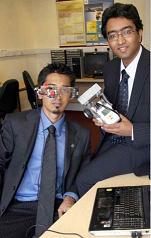Nov 26 2010
Suraj Verma, a Master’s of Science student at Bradford University’s School of Engineering, Design and Technology, has developed a vision-controlled wire-free robot. It works on the eye-tracking technology in which navigation of the robot is controlled by human eye.
 Vision Controlled Robot
Vision Controlled Robot
This robot was developed under the guidance of lecturer Dr. Prashant Pillai. Dr. Pillai has said that the innovative eye-tracking technology utilized in controlling the robot can be extensively applied in the field of assisted living, in particular for disabled people. He mentioned that the technology can be used for controlling an electric wheelchair by simply looking in the direction in which it has to be moved. He added that the developer would further explore this option to improve the life of the disabled.
The newly developed eye-tracker is mounted on the head. It identifies the eye movement and controls the movement of the robot correspondingly by means of a Bluetooth.
This project, named Intelligent Recognition for Interactive Systems (IRIS), can be further extended to offer a wide range of home automation solutions, like switching lights between on and off modes and controlling household devices via a X10 wireless protocol, which utilizes radio frequency waves.
Other potential features include controlling a mobile using computer, internet surfing, handling computer mouse, substituting game controls and ascertaining the extent of consideration given by users to the media including advertisement notices and articles.